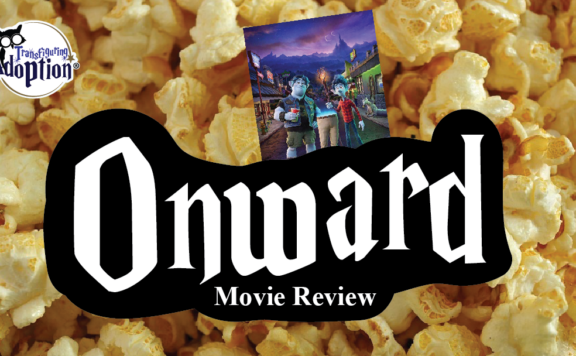Transfiguring Adoption’s Overview:
Eternals (2021) is the next Marvel installment that will be building the next Phase for the Marvel Cinematic Universe. Teens familiar with the Avengers and other heroes will likely be interested in this one though it does take place in a post-Avengers timeline. The target audience appears to be teens 13 and up. Caregivers should note this is not a “kids’ movie” and will have more mature themes and a longer run time due to this being a film for a more mature audience. This movie is not recommended for child viewing.
Overall the film itself was a great action film but is very long and has a complex story-line that younger children will not understand. There are some violence and sexual scenes as well that are not suitable for younger audiences. Just because a film has superheroes does not immediately make it a kid-friendly movie and parents should always consider MPAA ratings before taking their children to movies even before considering potential trauma triggering.
** Spoilers Could Be Ahead **
How Is This Relevant To Adoption & Foster Care?
While characters are not explicitly in foster or adoptive care, the Eternals are shown through time living and interacting with one another as a sort of blended family. With this comes love and support but also conflict and strife, especially when truth is withheld concerning the Eternals origins and true mission.
While your child may not have the backstory that Ajak, Sersi, Ikaris, Kingo, Thena, Gilgamesh, Phastos, Makkari, and Sprite share in discovering their entire existence is a lie… if they have been through adoption or the child welfare system they will likely have a lot of questions as they grow up about their own origin story. And rightfully so! Think about America’s obsession with ancestry DNA testing in the last decade as a most recent example of how aware humans are of their origins and connections. Just like any other person, your child is going to have questions about where they come from and how this influences their identity and their future. It’s tempting for caregivers to want to brush these questions away because the questions are hard to answer, literally and emotionally. We may not know the answers and be afraid of what our child will find out. Caregivers may also worry that newfound information could drive a wedge between them and the child they care for. However, caregivers should remember that raising a child of any sort will come with hard questions and situations because of the complexity that is being human and that it is our responsibility to help guide our children through these complex concerns so they are not alone with these intense emotions and situations. Ultimately, helping your child answer their innermost questions may be what that child needs to complete grief processing and find acceptance while we all want for our traumatized children. Of course, all inquiries need to be in compliance with state and federal laws and age appropriate so please glean on the knowledge and experience of your team and therapist as you and your child potentially forge ahead on such a quest. The more support the better on such a journey!
Discussion Points:
- Family of Origin Story
Even when far apart children will long for and think of their biological family. This is human nature as we are biologically wired to form attachment to our primary caregivers at birth. For this reason caregivers need to be prepared for their children to ask questions or talk about their biological family and not discourage such conversation. Even if the biological family was not in the picture for long they still represent much of your child’s identity and culture and should be given respect as such. Though it’s hard because caregivers often focus on the pain and suffering a biological relative may have caused that led to removal, the biological family always deserves our utmost reverence especially when speaking to our children. Our child literally wouldn’t exist without them and it’s important to remember that, especially when things are feeling hard or intense.
- Navigating Family Dynamics
One major plot point for the film is that the Eternals function very much like a family in their thousands of years spent on Earth. As a result of the time spent together there is intimacy between several persons in the group, some familial and some romantic. As it was for the Eternals, family dynamics can be difficult for children adjusting to a new normal especially if their new family is culturally different in how they express love or conflict. As a result it’s important for caregivers to watch for children to signal a need for help when these dynamics become confusing or difficult.
- Keeping Secrets Hurts
In addition to the pseudo-family dynamics there are some romantic dynamics within the group that become toxic due to members of the Eternals not being honest with each other. The revelation of Ajax and Ikaris keeping the mission’s goal a secret splinters the Eternals and nearly causes Earth’s destruction and costs Ajak her life. Ikaris not being honest with Sersi splinters their relationship. Sprite being dishonest about her feelings towards Ikaris fragments her relationship with others. Ajak not sharing what Mahd Wy’ry truly was. Druig left the group due to the secrecy around the mission to Earth. Even Sersi not telling Dane about her true identity could have had some pretty major consequences had she not told him once she finally did. While it was great that most of the Eternals were able to rally together and save Earth last minute much of the conflict could have been avoided with open and honest communication. Our families are the same way. Parents want to avoid children feeling pain and hide information. Children hide mistakes in fear of getting rejected. If parents and children can find even ground for better communication though the hard times can be times where families lean on one another for support rather than forging ahead alone.
Cautionary Points:
- Fantasy Violence
For an action movie this film isn’t too terrible with violence but there are some fantasy violence sequences. This includes Deviants (monster-looking beings) harming or eating people, superpower-based battles, buildings being damaged in fights, cars being thrown, and other events that cause harm to people. Remember, children and teens who have been through trauma sometimes can self-sabotage in response to bursts of adrenaline even from fun experiences like enjoying an action movie because this is the same neural pathway their traumatized brain goes through when they are experiencing fight-or-flight responses to danger. This means your child could potentially act out with survival behaviors or have nightmares in response to the violence depicted in this movie. So with a movie with this level of violence you are also risking your child becoming retraumatized from past events and responding to all of the various trauma triggers plus associating a fun experience with all of it.
- Character Deaths
Through the course of the film Ajak and Ikaris eventually die. Ajak is revealed to have been murdered by Ikaris pushing her into a Deviant den and Ikaris commits suicide by flying into the sun after the events of the film likely in an act of atonement. Teens can be triggered by these losses and remember their own grief and this may be difficult for a child, especially since Ajak and Ikaris do have a familial bond shown throughout the film and the act of betrayal may be especially intense. Gilgamesh also dies onscreen following violent attack and power drain from a Deviant. Druig appears to be killed towards the end of the film but does survive.
- Deceptions/Fatal Betrayal
Through the course of the film it is discovered that Ajax knew of the Eternals’ true origins and mission the entire time. It was also discovered that Ikaris knew the true origin and mission as well and killed Ajax to prevent her from telling the others and trying to save Earth. Sprite also literally stabs Sersi in the back after defecting the Eternals with Ikaris due to having secret love for him and feeling jealous of Sersi. Druig also starts a cult to keep humans from fighting in Mesoamerica and prevents humans’ free will to do so. Most of these are very intense scenes that may trigger teens that have suffered from being lied to or feeling such levels of betrayal.
- Violent Depictions of Mental Illness
During the film Thena is portrayed as developing Mahd Wy’ry, which is believed to be her caving under the stress of the mission. In reality this is Thena remembering her true past and memories. However, whenever Thena disassociates she grows violent and begins attacking the Eternals which leads to her and Gilgamesh leaving the Eternals to avoid her having her memories wiped. Teens with trauma may have witnessed or heard of mentally ill relatives or connections that have reacted violently. While this is not the norm for most persons with mental illness this depiction can bring up memories of violence and cause the brain to react to such scenes as in other violent scenes and put the child in fight or flight themselves.
- Brief Nudity
There is a scene between Sersi and Ikaris that is very sensual and ends with a waist-up shot of them unclothed on the ground grinding on one another. It is implied they are having sex but younger audiences may believe they are just making out depending on their knowledge of sexual encounters due to the camera angles. While most teens will likely not be severely triggered by this scene some children with sexual abuse backgrounds or trauma related to sexuality may struggle with the more sensual scenes.
- Images of War/Genocide
Throughout the movie the Eternals are instructed not to interfere with various points in Earth’s history. This includes moments of war (including Hiroshima) and scenes where conquistadors are invading Mesoamerica and committing genocide. This is directly pointed out by Druig in particular as being genocide. Teens who have been exposed to such violence and injustice may be triggered by watching the Eternals be bystanders to such atrocities.
- Abandonment
Kingo abandons Sprite in Macedonia because she doesn’t age and makes others suspicious. Ikaris also abandons then-wife Sersi because he learns the Eternals true origins and mission and cannot face her knowing the truth and not telling her. While these abandoning are not actively done on screen, teens can be triggered in recalling their own feelings of abandonment and need help in processing such large, deep emotions.
- On-Screen Abduction
At the end of the film some of the Eternals are abducted by Ashiram to answer for their defection from his plan to destroy Earth to expand the universe. A post-credit scene insinuates the next film will be a rescue mission for the Eternals abducted.
- Mature Humor
There are sequences of Sprite (the most youthful-looking Eternal) flipping off other characters and other such interactions. There is also banter around mead drinks being alcoholic vs. nonalcoholic in another scene. - Elemental Crises
There are several elemental-related catastrophes such as tsunami, volcanic eruptions, and earthquakes shown in the film. This may be triggering for teens who have been through such crises in the past.
About the Reviewer: Rachael Rathe
Rachael B. Rathe is an East Tennessee native with a Bachelor of Arts Degree in
Psychology with a Minor in Child & Family Studies from The University of Tennessee
Knoxville. She has worked in mental health since 2013 and in foster care/adoptions for a private provider agency since 2014. Rachael was inspired to work in the field after
working with children and teens on a volunteer basis 2008 – 2013. Rachael’s ideal
self-care day involves snuggling on a couch with her kitties (Tabitha, Fergus, and Rufus) while enjoying a good movie or book. She also enjoys galavanting around conventions concerning all things nerd and geekery.
Transfiguring Adoption is a nonprofit organization seeking to nurture growth in foster and adoptive
families by giving a HOOT about their families. Transfiguring Adoption does not intend for its
reviewers nor its reviews to be professional, medical or legal advice. These reviews and discussion
guides are intended to help parents to better be able to connect and understand their children who
come from traumatic backgrounds





